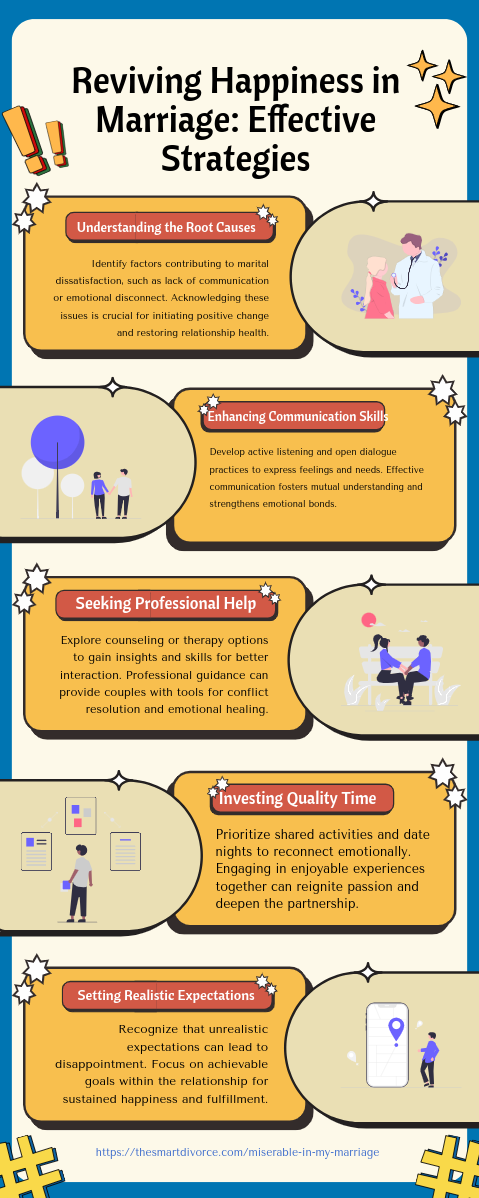Marriage, often perceived as a lifelong partnership filled with love, companionship, and support, can also be a source of discontent for many. If you find yourself in a cycle of resentment, lack of communication, and unmet needs, you’re not alone. Many couples, like you, reach the stage where they start considering divorce as a solution. But before making any decisions, it’s crucial to remember that your situation is not unique, and there are options to explore to understand the dynamics beneath the bitterness in your marriage.
Why You May Feel Miserable in Your Marriage
If you’re feeling discontent in your marriage, it’s crucial to understand the reasons behind your feelings. Marital misery often stems from unmet expectations, poor communication, or different life goals. By recognizing these factors, you can take the first step towards improving your situation. For example, Sarah and John, who dreamt of a happy life together, found themselves feeling more like roommates than partners as the years passed. Their different ideas about a good marriage led to frustration and a sense of unhappiness. But by understanding these differences, they can work towards a solution.
Common Reasons for an Unhappy Marriage
Feeling discontent in your marriage can come from several issues. Here are some common reasons why many couples feel unhappy:
- Lack of Communication: When partners stop talking effectively, misunderstandings grow, and feelings of disconnect increase. Sarah and John rarely discussed their unease. Instead, they avoided tough conversations, which only made things worse. A couples therapist can help couples learn how to communicate better and understand each other’s needs.
- Unmet Emotional and Physical Needs: When one or both partners feel their emotional or physical needs aren’t met, ongoing dissatisfaction builds. This often happens when initial romantic efforts fade or life changes, like having children or shifting priorities. John felt neglected when Sarah, overwhelmed with raising their kids, stopped giving him attention. They may need a family therapist to help them reconnect emotionally and physically.
- Resentment and Blame: Over time, couples may start blaming each other for their dissatisfaction, turning their marriage into a battleground. Blaming each other only creates more distance and resentment. Sarah blamed John for not helping more with the kids, while John blamed Sarah for being distant.
- Unrealistic Expectations: Expecting your partner to fulfill all your happiness needs or changing behaviours to suit your desires often leads to disappointment. A healthy marriage requires understanding and adjusting expectations. Sarah and John had idealized versions of marriage, which reality failed to meet.
Signs of a Miserable Marriage
It can be hard to recognize the signs of an unhappy marriage, especially if you’re focused on staying together for the kids or because of other family obligations. Here are some signs that indicate you may be in a miserable marriage:
- Constant Arguing: If you and your spouse argue more than you have positive interactions, this is a sign of deep issues. A couples therapist can help identify the root causes of these arguments.
- Emotional Distance: Feeling emotionally distant from your spouse can create a sense of loneliness and sorrow. Time apart might give you a break, but it won’t solve the problem.
- Avoiding Physical Intimacy: If you or your partner avoid physical contact or intimacy, it could indicate unresolved emotional issues or unmet needs.
- Thinking About Separation or Divorce: Frequently thinking about leaving your partner or getting divorced shows you’re deeply unhappy with the relationship.
What to Do When You’re Miserable in Your Marriage
If you’re in a miserable marriage, it’s essential to take action. Here are some steps to help improve your situation:
- Seek Help from Mental Health Professionals: Consulting a mental health counsellor or a family therapist can help you understand your feelings and improve communication with your spouse. Sometimes, unhealed wounds from the past can affect your present relationship, and a therapist can guide you through the healing process.
- Invest in Quality Time Together: Spending quality time together can help overcome the sense of aloneness and rebuild your connection. Find activities you both enjoy and make them a routine. This can help strengthen your bond and improve your relationship.
- Consider a Sex Therapist: If physical intimacy is an issue, a sex therapist can help address these concerns. They can provide strategies to rekindle physical closeness and intimacy in your marriage.
- Communicate Openly and Honestly: Clear, honest communication is crucial for any relationship. Try to talk about your feelings and listen to your partner without judgment. This helps you understand each other’s needs better and fosters empathy.
- Set Boundaries and Manage Expectations: It’s okay to set boundaries and have different interests. It’s also crucial to manage expectations and understand that no one can meet all of another person’s needs.
The Role of a Mental Health Counselor in Improving Your Marriage
Mental health professionals, such as counsellors and therapists, can play a vital role in helping couples navigate marital challenges. They offer a safe space for partners to express their feelings and work through conflicts. Here’s how they can help:
- Guiding Effective Communication: A mental health counsellor can teach you and your spouse how to communicate more effectively, helping to reduce misunderstandings and arguments.
- Helping You Understand Unmet Needs: Sometimes, partners don’t know how to express or recognize their spouse’s needs. A therapist can help you both become more aware of these needs and work towards resolving these issues.
- Providing Tools for Conflict Resolution: Counselors offer practical strategies for resolving conflicts healthily. They can guide you in finding compromise and understanding the disputes better.
- Addressing Mental Health Issues: Mental health issues like depression or anxiety can affect your marriage. A mental health professional can provide the necessary support and treatment to address these issues.
What to Do in an Unhappy Marriage: Seeking Support and Making Changes
If you’re unhappy in your marriage, seeking support and making positive changes is essential. Here are some ways to take action:
- Reach Out for Professional Help: Consult a mental health counsellor or a couples therapist to get professional advice tailored to your situation. They can help you work through your problems and find solutions.
- Take Time for Self-Care: Taking care of your mental health and well-being is crucial. Make sure to engage in activities that bring you joy and relaxation.
- Explore New Ways to Connect: Try new activities to strengthen your bond. Finding new ways to connect can positively change your relationship, whether it’s a hobby, a class, or simply spending time outdoors.
- Assess Your Relationship: Sometimes, it’s necessary to take a step back and assess whether staying together is the best option for both partners. If the relationship is harmful or involves domestic violence, it may be best to seek help to leave the relationship safely.
The Bottom Line: Finding Hope in a Miserable Marriage
Feeling miserable in your marriage can be overwhelming, but there are steps you can take to overcome the grief and improve your situation. You can work towards a happier and healthier partnership by seeking professional help, investing time and effort in your relationship, and exploring new ways to connect. However, if staying together is no longer viable, it’s essential to consider all possibilities and prioritize your well-being and safety.
Final Thoughts
Remember that you have options if you’re feeling miserable in your marriage. Exploring all avenues and taking proactive steps to address your feelings and relationship dynamics is essential. Divorce should be the last resort, but it can be a healthy decision when approached thoughtfully and with the proper support.
At The Smart Divorce
At The Smart Divorce, we understand how challenging it can be to feel trapped in an unhappy marriage. You don’t have to navigate this journey alone. Our Certified Divorce Specialists are here to help you gain clarity and make the best decisions for your future. If you’re ready to explore your options and learn more about how divorce coaching can help you, we invite you to schedule a Complementary Get-Acquainted Call with us today. Book your call here.
Links to additional resources you may find useful
- 20 Habits That Destroy A Relationship
- What Are Signs That It Might Be Time To Go To Couples Therapy | Morgan Virtual Psychiatry
- Why Does Love Hurt So Much? – International Coalition for Genital Integrity
- Navigating Stormy Waters: How to Solve Relationship Problems Without Breaking Up – Aaron Jarrels: Relationship and Mindset Coach | Public Speaker | Podcast Host


